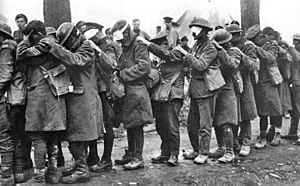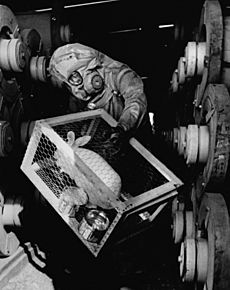Geneva Protocol facts for kids
| Protocol for the Prohibition of the Use in War of Asphyxiating, Poisonous or other Gases, and of Bacteriological Methods of Warfare | |
|---|---|
| Drafted | 17 June 1925 |
| Signed | 17 June 1925 |
| Location | Geneva |
| Effective | 8 February 1928 |
| Condition | Ratification by 65 states |
| Signatories | 38 |
| Parties | 146 |
| Depositary | Government of France |
The Geneva Protocol is an important international agreement. It stops countries from using chemical weapons and biological weapons during wars between them. This agreement was signed in Geneva on June 17, 1925. It officially started on February 8, 1928.
This protocol specifically bans the use of "poisonous or other gases" and "bacteriological methods of warfare." This means it forbids both chemical and biological weapons. However, it doesn't say anything about making, storing, or moving these weapons. Later agreements, like the 1972 Biological Weapons Convention and the 1993 Chemical Weapons Convention, covered those parts.
Some countries, when they joined the Geneva Protocol, added special conditions. They said they would only follow the rules if other countries also followed them. They also said they would stop following the rules if these banned weapons were used against them.
Today, many people believe the main rules of the Geneva Protocol are part of something called customary international law. This means they are rules that countries follow because they are widely accepted as fair and necessary.
Contents
Why the Protocol Was Created

Before the Geneva Protocol, some agreements like the Hague Conventions of 1899 and 1907 tried to ban dangerous chemicals in war. But during World War I, chemical warfare was used on a huge scale.
France used tear gas in 1914. But the first big use of chemical weapons was by Germany in 1915. They released chlorine gas during a battle in Belgium. After this, many countries, including the United Kingdom, Russia, and the United States, started using chemical weapons too.
This led to a race to create more terrible chemicals. These chemicals could harm lungs, skin, or eyes. Some, like hydrogen cyanide, were meant to kill. About 1.3 million people were hurt by gas during the war. The fear of gas also had a big effect on soldiers.
As gas masks and other protective gear improved, countries developed new ways to get around them. Deadly poison gas didn't just affect soldiers. It also put civilians at risk when winds blew the gases into nearby towns. Civilians often had no warning or good gas masks. It's estimated that 100,000 to 260,000 civilians were hurt by chemical weapons during the war. Many people, both civilians and soldiers, died years later from lung damage, skin damage, and brain damage.
After World War I, the Treaty of Versailles banned Germany from making or importing chemical weapons. Other treaties did the same for Austria, Bulgaria, and Hungary. However, some countries, like Britain, continued to use chemical weapons in other conflicts.
In 1922, the United States tried to create a new treaty about submarines and harmful gases. Four countries agreed, but France didn't like the rules about submarines, so the treaty failed.
Then, at a meeting in Geneva in 1925, France suggested a new agreement to ban poisonous gases. Poland added the idea of banning biological weapons. This led to the signing of the Geneva Protocol on June 17, 1925.
How Effective Was It?
Some experts, like Eric Croddy, have said that the Geneva Protocol wasn't always very effective. This is because it didn't stop countries from:
- Using these weapons against countries that hadn't signed the protocol.
- Using these weapons in return if they were attacked with them. This made it more like a "no-first-use" agreement.
- Using these weapons within their own country during a civil war.
- Researching, developing, or storing these weapons.
Because of these gaps, the protocol allowed countries to keep working on biological weapons. This sometimes led to a race to build more of them.
For example, the Geneva Protocol was not broken when Spain used chemical weapons in the Rif War until 1927. Japan used them against rebels in Taiwan in 1930. Iraq used them against Kurdish civilians in 1988. And chemical weapons were used during the Syrian civil war. These uses were often against a country's own people or in conflicts not covered by the protocol's specific rules.
Even though the U.S. supported the protocol, its military and chemical societies argued against it. So, the U.S. Senate didn't officially approve it until 1975. That was the same year the U.S. also approved the Biological Weapons Convention.
Times the Protocol Was Broken
Despite the treaty, some countries have used or prepared chemical weapons in wars.
- Italy used mustard gas against Ethiopia in the Second Italo-Ethiopian War.
- Japan used chemical weapons against China in the Second Sino-Japanese War.
During World War II, the U.S., the UK, and Germany got ready to use chemical weapons. There was an accidental release of mustard gas in Bari, Italy. This happened when a U.S. ship carrying chemical weapons sank during an air raid, causing many deaths. After the war, thousands of tons of chemical weapons were dumped into the sea by the Allies.
In the 1980-1988 Iran-Iraq War, Iraq used many types of chemical weapons against Iranian soldiers. About 100,000 Iranian troops were hurt by these weapons during that war.
Countries That Joined
To join the Protocol, countries send an official document to the government of France. France is the country that keeps track of the agreement. Thirty-eight countries first signed the Protocol. France was the first to approve it in 1926. El Salvador was the last of the original signers to approve it in 2008. As of April 2021, 146 countries have joined the Protocol. Colombia was the most recent in 2015.
Special Conditions (Reservations)
Many countries added special conditions, called "reservations," when they joined. These conditions often said they would only follow the rules if other countries also followed them. Or, that the rules would stop applying if the banned weapons were used against them or their allies. Some Arab countries also stated that joining didn't mean they recognized or had diplomatic ties with Israel.
Over time, many countries have removed their reservations. For example, the former Czechoslovakia removed its reservation in 1990. Russia also removed its reservation about biological weapons in 2001.
When a new country becomes independent, it usually keeps any reservations its former ruling country had. Unless it says otherwise, these "implicit" reservations remain.
Other Agreements About Chemical Weapons
| Year | Name | What it did |
|---|---|---|
| 1675 | Strasbourg Agreement | The first international agreement to limit chemical weapons, specifically poison bullets. |
| 1874 | Brussels Convention on the Law and Customs of War | Tried to ban poison weapons, but it never officially started. |
| 1899 | 1st Peace Conference at the Hague | European countries agreed not to use "projectiles" that spread "asphyxiating or harmful gases." |
| 1907 | 2nd Peace Conference at the Hague | Added a ban on poison or poisoned weapons. |
| 1919 | Treaty of Versailles | Banned poison gas in Germany. |
| 1922 | Treaty relating to the Use of Submarines and Noxious Gases in Warfare | Failed because France didn't agree with the submarine rules. |
| 1925 | Geneva Protocol | Banned the "use in war of asphyxiating, poisonous or other gases" and "bacteriological methods." |
| 1972 | Biological and Toxins Weapons Convention | Banned biological and toxin weapons. It didn't have a way to check if countries were following the rules. |
| 1993 | Chemical Weapons Convention | A full ban on making, storing, and using chemical weapons. It also set timelines for destroying them. |
| 1998 | Rome Statute of the International Criminal Court | Made it a war crime to use chemical weapons in international conflicts. (An update in 2010 extended this to conflicts within a country.) |
Images for kids
See also
 In Spanish: Protocolo de Ginebra para niños
In Spanish: Protocolo de Ginebra para niños
 | Isaac Myers |
 | D. Hamilton Jackson |
 | A. Philip Randolph |



